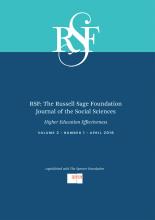Abstract
For several decades, policymakers have been concerned about increasing the efficiency and effectiveness of postsecondary institutions. In recent years, performance funding—which directly connects state funding to an institution's performance on indicators such as student persistence, credit accrual, and college completion—has become a particularly attractive way of pursuing better college outcomes. But even as states have made an enormous investment in performance funding, troubling questions have been raised about whether performance funding has the effects intended and whether it also produces substantial negative side effects in the form of restrictions in access for underrepresented students and weakening of academic standards. This paper addresses these troubling questions by drawing on data richer than heretofore available. In addition to drawing on the existing body of research on performance funding, it reports data from a study of the implementation of performance funding in three leading states (Indiana, Ohio, and Tennessee) and its impacts on three universities and three community colleges in each state.
- performance funding
- performance-based funding
- outcomes-based funding
- higher education accountability
- educational accountability
- public accountability
- performance management
- performance-based management
- quality assurance
- higher education policy
- college quality
- Copyright © 2016 by Russell Sage Foundation. All rights reserved. Printed in the United States of America. No part of this publication may be reproduced, stored in a retrieval system, or transmitted in any form or by any means, electronic, mechanical, photocopying, recording, or otherwise, without the prior written permission of the publisher. Reproduction by the United States Government in whole or in part is permitted for any purpose. We wish to thank Lumina Foundation for its support for this research. The views expressed in this report are those of its authors and do not necessarily represent the views of Lumina Foundation, its officers or employees. We also wish to thank Ronald Abrams, Steven Brint, Charles Clotfelter, Kevin Corcoran, Russ Deaton, Alicia Dowd, William Doyle, Nicholas Hillman, Davis Jenkins, Alison Kadlec, Marcus Kolb, Vanessa Morest, John Muffo, Richard Petrick, Jeffrey Stanley, Susan Shelton, David Tandberg, Sean Tierney, and William Zumeta for their comments on earlier papers and reports that have fed into this paper. Any remaining errors are our own. Direct correspondence to: Kevin Dougherty at dougherty{at}tc.edu, Teachers College, Columbia University, Box 11, 525 W. 120th St., New York, NY 10027; Sosanya M. Jones at smjones{at}siu.edu; Hana Lahr at hel2112{at}tc.columbia.edu; Rebecca S. Natow at rebeccanatow{at}yahoo.com; Lara Pheatt at lep2148{at}tc.columbia.edu; Vikash Reddy at vtr2107{at}tc.columbia.edu.
Open Access Policy: RSF: The Russell Sage Foundation Journal of the Social Sciences is an open access journal. This article is published under a Creative Commons Attribution-NonCommercial-NoDerivs 3.0 Unported License.






